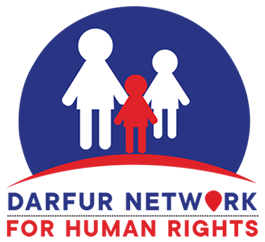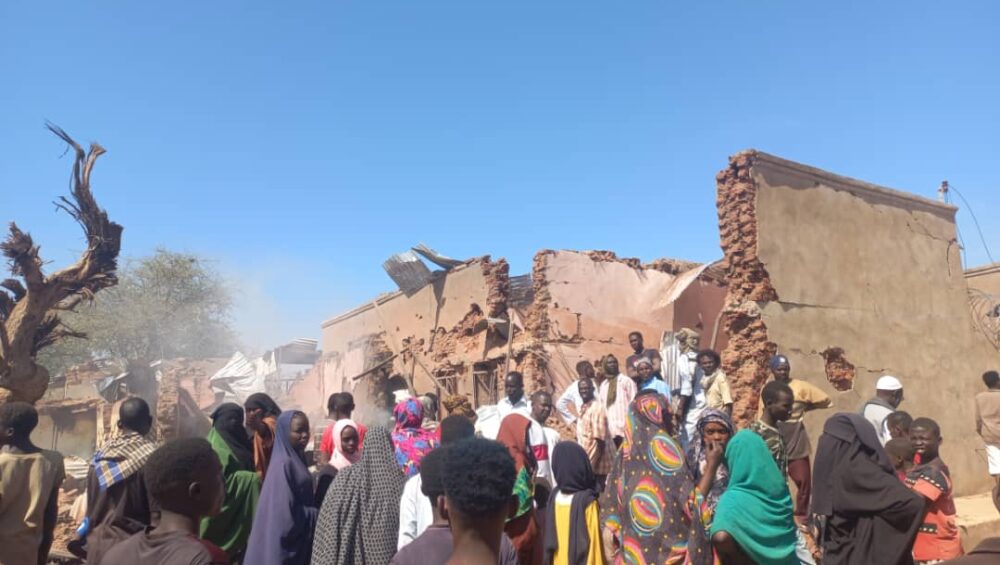(Kampala) – The war in Khartoum broke out on April 15, 2023, and swiftly reached all parts of Sudan, including South Darfur. The capital city of Nyala has borne the brunt of this ongoing conflict, initially at the hands of the Sudanese Armed Forces (SAF) and subsequently from the paramilitary group Rapid Support Force (RSF).
SAF’s imposition of authority:
As the conflict erupted in Khartoum, SAF increased its presence in Nyala, imposing curfews on markets, which intensified alongside other authoritarian changes. Reports received by the Darfur Network for Human Rights (DNHR) reveal that SAF has detained numerous people from the Arab tribe, mostly based on suspicion of being RSF members. A ground monitor for DNHR reported that SAF soldiers shot and killed Hashim Mohammed Ibrahim, a 40-year-old businessman in the market. Subsequently, he was accused of collaborating with RSF.
Violence and plunder by SAF:
Reports received by DNHR indicate that SAF has burned all the stores in the South and Big market of Nyala, including medical stores. These markets were the largest in Nyala. A 34-year-old local businessman from the Neil locality of Nyala said, “I had a cloth store in the South market; they have burned it too.” SAF soldiers also looted vehicles belonging to residents, storing them in their headquarters. After RSF took over, RSF is now utilising these seized vehicles.
In a horrifying incident reported to DNHR, SAF shelled the Tyeba bridge, resulting in the tragic loss of 36 lives. The victims were attempting to seek refuge from the confrontation between SAF and RSF.

(Funeral of people who died in the shelling of Tyeba bridge)
On December 29, SAF conducted an aerial bombardment on the innocent civilians of Nyala, resulting in a devastating toll on the community. More than 10 civilians were killed, and 30 others, including women and children, were wounded. The indiscriminate attack also led to the destruction of numerous homes and properties. DNHR has diligently documented and published a comprehensive report on this tragic incident, providing video evidence to support the gravity of the situation.
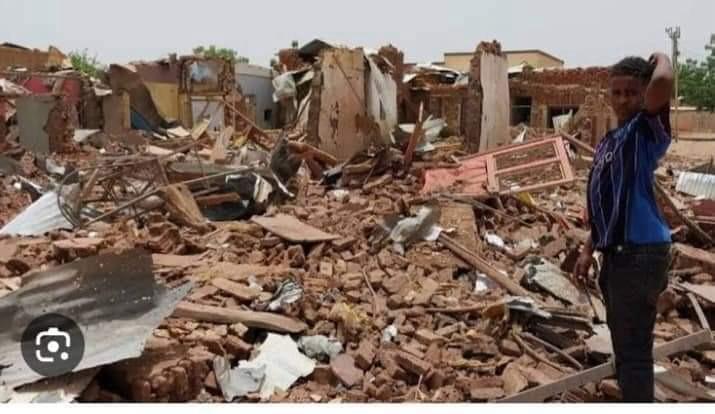
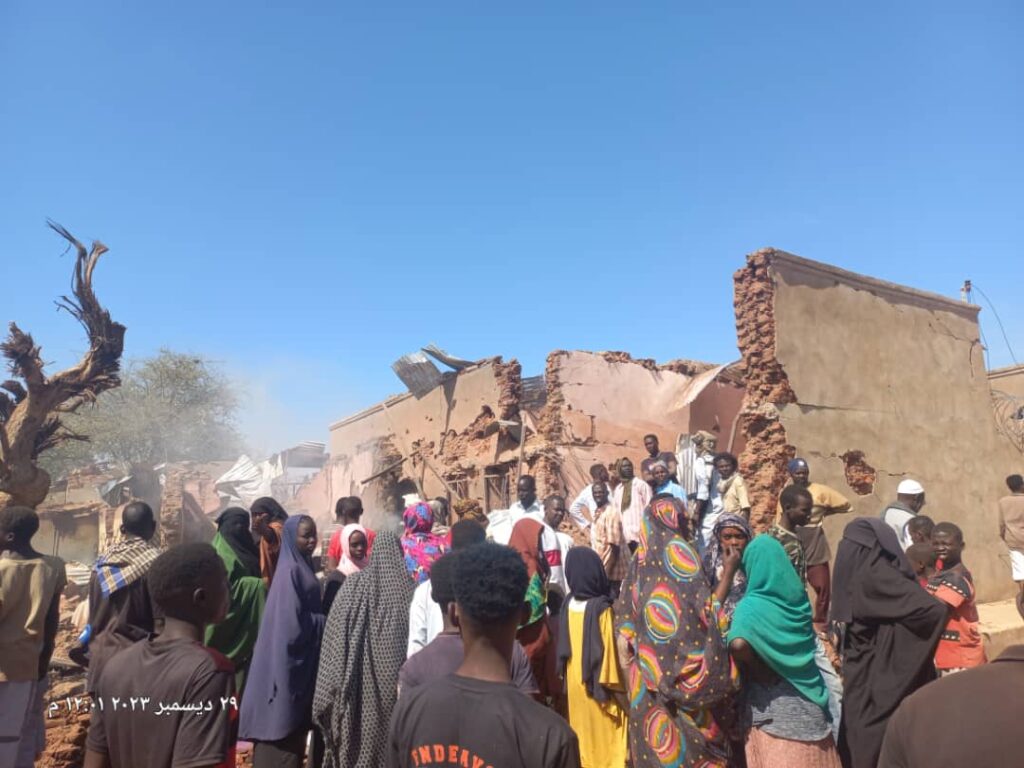
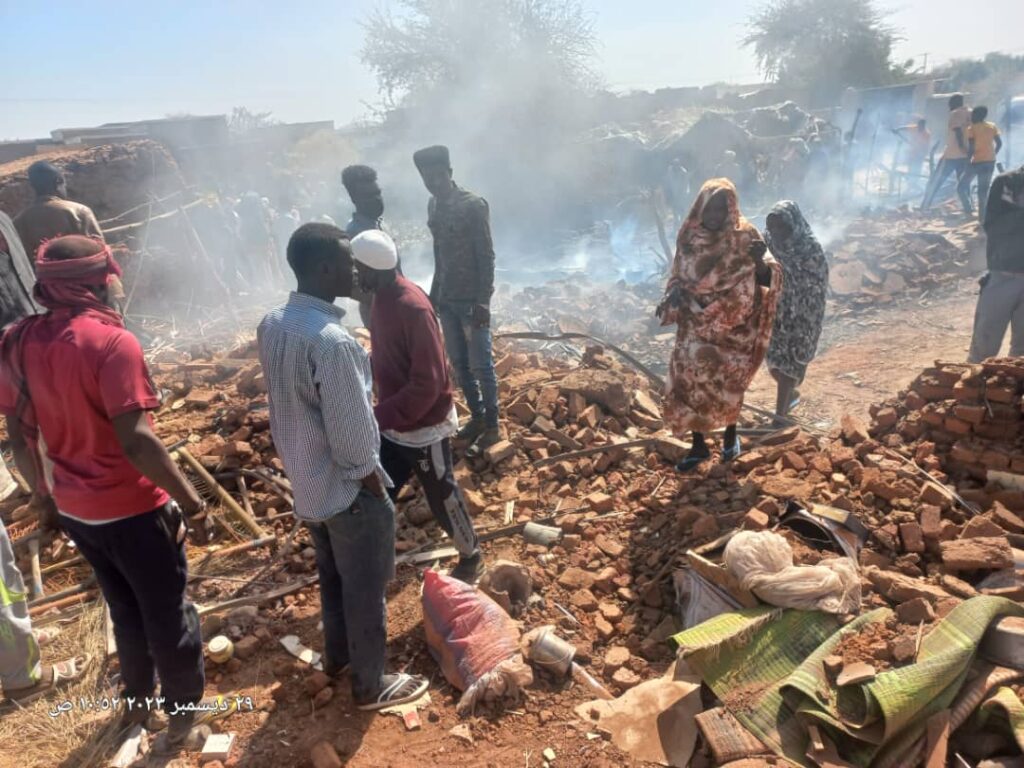
(Destruction by aerial bombardment)
RSF takeover and escalation in violence:
Amidst the suffering caused by the RSF takeover of Nyala, the situation has deteriorated significantly for the local population. Following the RSF takeover, the paramilitary forces engaged in looting local banks and civilian residences. They imposed restrictions on freedom of movement, leading to an escalation of violence, mainly targeting the black Sudanese population.
The highest number of killings by RSF occurred near the Yashfin Medical Center, one of the initial locations where RSF took control. Individuals found crossing that area are randomly shot, adding to the already dire circumstances.
Economic fallout and food crisis:
The burning down of the main markets by SAF has increased food prices in smaller markets. The residents are now heavily dependent on smaller markets like Al Jabbal, Al Geneina, and Al Shapei, especially for essential food supplies. In the Neil neighbourhood, community kitchens have been established to assist those who can no longer afford food, reflecting the extent of the humanitarian crisis.
Gender-based violence and RSF’s new taxation policies:
The surge in gender-based violence, especially against women throughout South Darfur since the RSF takeover, mainly targeting the black Sudanese population, has created a distressing situation. Residents report a significant increase in rape cases, with the Al Rahman neighbourhood being particularly affected. According to one resident, the local RSF leader, Salah Alfotie, residing in Al Rahman, he and his soldiers are allegedly associated with numerous incidents, contributing to the distressing rise in gender-based violence.
Following the takeover by the RSF, under the leadership of Abdul Rahim Hamdan Dogolo, deputy commander of the RSF, a restructuring of local administration occurred. People of Arab tribes were appointed governors and local leaders, reflecting a regional governance shift. The RSF further established a tribal council, consolidating their influence.
To exert control and fund their operations, the RSF imposed heavy taxes on residents, requiring payments for movement between neighbourhoods and the transportation of goods. Refusal to pay these taxes resulted in detentions. The RSF’s use of shipping containers in the Al Masane area to hold detained individuals adds another layer to the severe human rights violations unfolding in South Darfur.
Residents of South Darfur have reported additional hardships imposed by the RSF, highlighting the discriminatory taxation policies targeting black Sudanese people. A resident shared the burdensome tax rates, indicating that individuals with agricultural lands face charges of fifty thousand Sudanese pounds (approximately 80 USD) for one hectare (10,000 square meters). Additionally, keeping livestock incurs further costs, with a tax of two thousand Sudanese pounds (USD 3.33) for one sheep or goat and ten thousand Sudanese pounds (USD 16.64) for a cow. These taxes are enforced monthly or bi-monthly, creating economic strain solely on the black Sudanese population.
Worsening humanitarian crisis:
The situation in South Darfur continues to deteriorate, marked by a sharp increase in food prices and alarming levels of malnutrition, especially among women and children. The plight of the residents has forced many to leave their homes, becoming internally displaced persons (IDPs) or seeking refuge in neighbouring countries such as Chad, Ethiopia, Uganda, Egypt, South Sudan, Kenya, the Central African Republic, and other African nations.

(Resident’s leaving Nyala)
Conclusion:
Compounding the dire circumstances is the absence of humanitarian organisations in South Darfur, leaving the population vulnerable to rampant human rights violations. The lack of accountability further exacerbates the already challenging conditions faced by the people in the region.
The crisis in South Darfur demands immediate international attention and intervention to alleviate the profound suffering of the population. The global community must act swiftly to address the humanitarian crisis, hold perpetrators accountable, and restore peace and stability to this embattled region.
DNHR appeal:
DNHR does urgent plea for immediate attention, intervention, and steadfast commitment to upholding human rights and providing crucial humanitarian assistance in South Darfur and throughout Sudan. The ongoing crisis has reached unprecedented levels of suffering and calls for collective action to protect the rights and well-being of the affected population.
The people of Sudan, particularly those in South Darfur, are facing grave human rights violations perpetrated by various actors, including the Sudanese Armed Forces (SAF) and the Rapid Support Force (RSF). Extrajudicial killings, arbitrary detentions, gender-based violence, and discriminatory policies are causing immense hardship and tragedy. These actions violate the principles enshrined in international human rights law.
Immediate actions required:
- Humanitarian assistance: DNHR urgently calls for the immediate and unimpeded delivery of humanitarian assistance to all affected areas in Sudan. The people are in dire need of food, medical aid, and essential supplies to mitigate the impact of the crisis.
- International human rights monitors: Deploy international human rights monitors to investigate and document ongoing violations. This is crucial for establishing accountability and ensuring justice for the victims.
- Peacekeeping mission: DNHR implores the international community to support the deployment of a robust peacekeeping mission in Sudan to protect civilians, facilitate the safe return of internally displaced persons (IDPs), and restore peace and stability.
- Diplomatic engagement: Exert diplomatic pressure on all the parties to cease all forms of violence, engage in meaningful dialogue, and collaborate with international efforts to address the crisis.
Solidarity and global commitment:
The severity of the situation in Sudan requires a unified and coordinated global response. Let us stand together in solidarity to protect the rights and dignity of all individuals in South Darfur and across Sudan.
We cannot stand idly by as innocent lives are lost and human rights are trampled upon. The international community has an obligation to intervene, alleviate the suffering of the affected population, and work towards a just and lasting resolution to the crisis.
DNHR urges you to act swiftly, decisively, and with unwavering commitment to human rights and humanitarian assistance principles.
